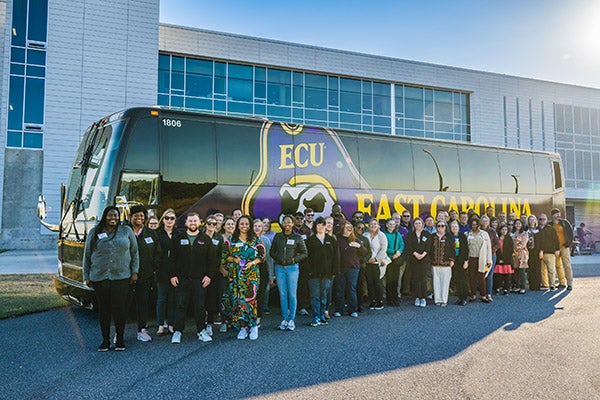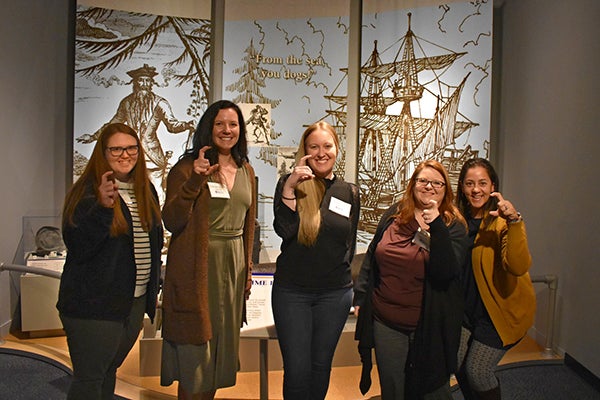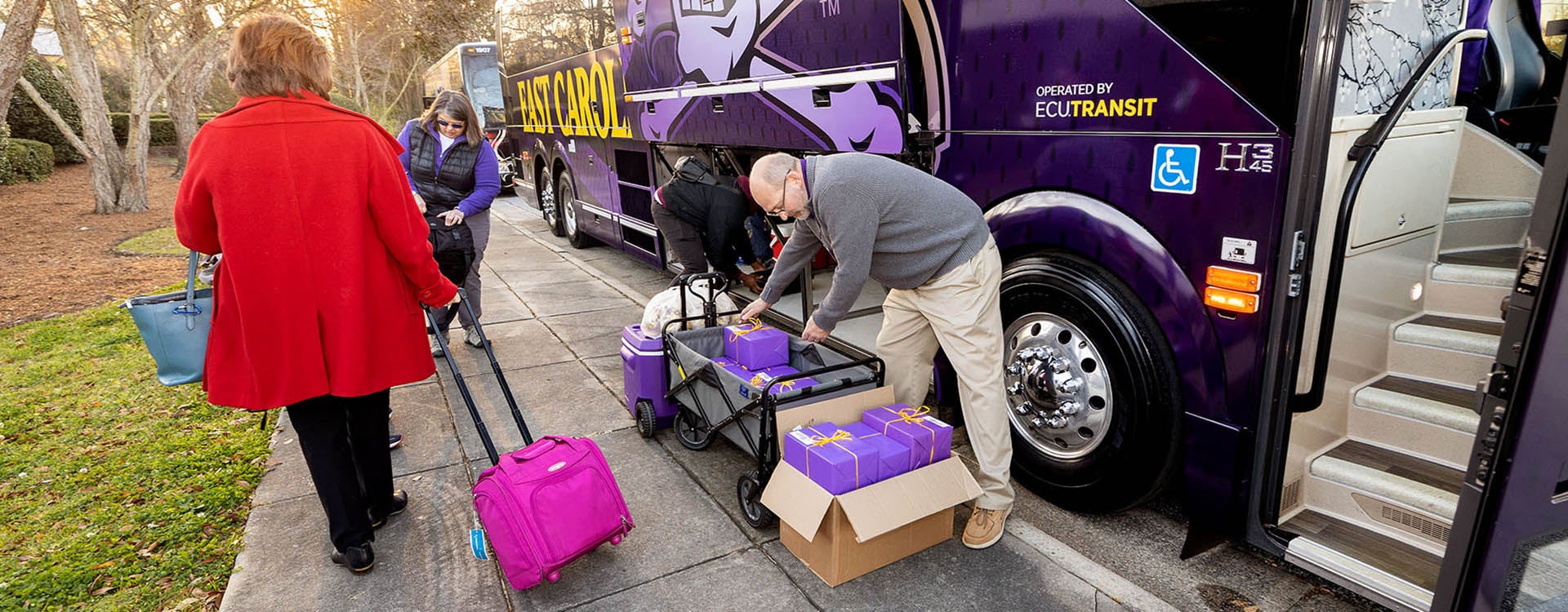REDE bus tour encourages collaboration for transformation
While many stayed home or traveled to warmer climates during spring break, a group of East Carolina University faculty, students and staff embarked on a tour throughout eastern North Carolina’s rural and remote areas.
The purpose: to engage with community partners and to explore ways to connect ECU’s knowledge and skills with the needs of industries and organizations. The hope: that collaborations and ideas lead to long-term benefits felt throughout eastern North Carolina.

The sixth annual Purple & Gold Bus Tour, led by the Office of Research, Economic Development and Engagement, included 65 students, faculty and staff. (Contributed photo)
The sixth annual Purple & Gold Bus Tour, organized by the Office of Research, Economic Development and Engagement, traveled a northeastern route along country and coastal roads March 6-8. It was the longest and largest Purple & Gold Bus Tour with 65 participants traveling to 12 locations across eight counties.
This year’s tour was funded in part by a grant from the U.S. Health Resources and Services Administration’s (HRSA) Advanced Nursing Education Workforce Program. The HRSA grant aims to achieve health equity, grow a skilled health care workforce and make advancements through innovative programs.
Rural health care was one focus area on the trip, and several stops highlighted successes and challenges in health care in rural communities. Students from ECU’s College of Nursing, including Advanced Practice Registered Nurse (APRN) RURAL Scholars, participated.
“All APRN RURAL Scholars attend the Purple and Gold Bus Tour as part of their traineeship. It has been an enriching activity for our students since they began attending the tour in 2020,” said Pam Reis, associate professor and Ph.D. program director in the ECU College of Nursing.
The first stop of the tour was Lancaster Farms in Wilson, a 10,000-acre family farm in production for over 200 years. Before receiving a behind-the-scenes look at farm operations and learning about its sustainable farming practices, ECU faculty experts introduced participants to the farm worker health crisis. Daily stresses, demanding schedules and reluctance to seek medical attention due to demands or stigmas are some factors ECU rural health experts face.
Just down the road at Wilson Corporate Park, participants toured a Fresenius Kabi manufacturing facility that produces and packages pre-filled syringes for U.S. hospitals and clinics. Helping to meet the workforce needs of a growing industry, university staff discussed how ECU’s Eastern Region Pharma Center is generating education-to-career pathways. From business to engineering to criminal justice, ECU is creating ways for graduates to find employment within the pharmaceutical industry.
The ECU School of Dental Medicine’s (SoDM) Community Service Learning Center (CSLC) in Ahoskie is where the group met Pirates providing dental health services in an area where dental facilities are few and access isn’t easy for everyone. Next door to the CSLC, participants toured the Roanoke Chowan Community Health Center, a federally qualified health center offering preventative health care services to medically underserved populations. The clinic charges for services on a sliding scale based on what patients can manage financially.
Both locations cited lack of health resources, transportation, healthy foods and other factors as challenges that the centers are striving to meet. Ford Grant, director of ECU’s SoDM CSLC, noted he’s seeing graduates returning to the area to work because they feel they are doing something that matters and are making a difference.
Additional stops on the tour introduced participants to organizations aligned with economic, academic and industry concerns.
At Rocky Mount Mills, tour participants explored a once rundown cotton mill, innovatively revitalized into a complex that houses several breweries, restaurants, entertainment amenities, office spaces and residential lofts. Additionally, leaders from the Carolinas Gateway Partnership, a public-private agency dedicated to the economic development of Edgecombe and Nash counties, shared their efforts of recruiting, creating and expanding industry and business.

The bus tour made 12 stops across eight counties along its route this year, including stops at ECU’s Outer Banks Campus and the Museum of the Albemarle. (ECU photo by Kim Tilghman)
The group had an energizing visit with the Choanoke Area Development Association (CADA). Participants heard about the beneficial programs CADA offers to citizens of all ages to help them achieve better quality of life. Faculty and students were challenged to offer ideas for future collaborations between ECU and CADA, which sparked promising proposals.
In Elizabeth City, participants explored cultural and historic collections and dined with leaders at the Museum of the Albemarle. Then, aboard U.S. Coast Guard Air Station Elizabeth City, guests learned about the diversified workforce of an active air base and its operations. This was one of many stops where the group was welcomed by ECU alumni. Guests learned of the year-round work of restoring aircraft to keep them in service, which saves millions of dollars in purchasing new aircraft.
The Coastal Studies Institute in Wanchese treated guests to a session on its underwater photography, an important tool in telling the story of the work being done at ECU’s Outer Banks Campus and a vital aid to research into shipwrecks and other marine interests. Following a tour of the campus, faculty members launched into a brainstorming session to discuss ways they could form partnerships and collaborations through interdisciplinary research.
That evening, the group enjoyed a STEM@Starlight event at Jennette’s Pier. Presenters included Captain George Bonner, director of the NC Renewable Ocean Energy Program at the Coastal Studies Institute, and Grace Andrews, vice president of scientific research at Vesta. Topics and discussion centered on challenges and opportunities in energy and climate at the coast.
Final stops of the tour included Pettigrew State Park in Creswell, where ECU faculty and students have participated in archaeological digs. At Martin County Schools’ Innovation Campus in Williamston, participants toured the new state-of-the-art public school, which offers opportunities for students to learn about education and career pathways in health, science, technology, agriculture and more.
Experiencing the tour for the first time Angela Lamson, interim assistant vice chancellor of economic and community engagement, noted that the bus tour planning committee worked to encompass a diverse range of sites to visit and recruit participants that reflected every college on campus.
“This year’s tour reflected ‘One ECU.’ We had student, faculty, staff and alumni representation from every college and many other areas throughout ECU, including the libraries and student affairs. These participants were able to see the connection ECU has with our region, and we had time to reflect with one another on ways ECU can further community engagement throughout eastern North Carolina,” Lamson said.
Bus tour participant and nursing student Jesse Baccus said, “Overall, I am leaving this bus tour in absolute amazement of the uniquely diverse state in which we live. There are some amazing men and women who are passionate and perfectly placed in their work to make a difference in the lives of others in communities all across the state. Getting to glimpse this — just a small iota — was a true honor and privilege.”

The goal of the bus tour is to engage with community partners and explore ways to connect ECU’s knowledge and skills with the needs of regional industries, organizations and nonprofits. (ECU photo by Rhett Butler)